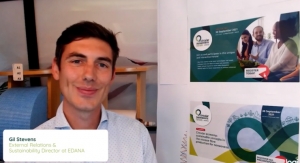07.08.21
EDANA and and its members that manufacture wet wipes have committed to revise package labelling to further raise consumer awareness on types of wipes and optimal disposal methods. This commitment will also see EDANA and pertinent members lead national awareness raising campaigns in the U.K. and a number of selected EU countries, beginning with the Netherlands in 2022.
The nonwovens and wipes industries have long been active in trying to address the serious problem caused by marine litter and of the role the industry has a duty to play in helping tackle it. In fact, EDANA has already invested in efforts to reduce wet wipe litter, raise consumer awareness on correct disposal, adopt a Code of Practice for labelling wet wipes and produce wipes that do not impact sewers. Now increased efforts, in conjunction with key stakeholders, and centered on a sound, science-based and collaborative approach can greatly help progress in this direction.
Under the new code of practices for wet wipes, all non-flushable, non-plastic wet wipes for sale in the EU with a suface are of 10 centimeters or more should bear a printed marking designating them as not to be flushed. This labeling aims to protect critical wastewater infrastructure and the environment.
Additionally, EDANA will run effective and consumer awareness campaigns about wet wipes disposal. By the end of 2021, EDANA will devise and launch a pilot project in The Netherlands that seeks to change consumer behavior with regard to the disposal of wet wipes. The pilot porject will include consumer surveys on labelling awarenss and behaviours to assess impact and will provide insight for member states in tehir implementation of the single use plastic directive. A similar initiative will soon after roll out in Belgium and other selected EU countries.
The nonwovens and wipes industries have long been active in trying to address the serious problem caused by marine litter and of the role the industry has a duty to play in helping tackle it. In fact, EDANA has already invested in efforts to reduce wet wipe litter, raise consumer awareness on correct disposal, adopt a Code of Practice for labelling wet wipes and produce wipes that do not impact sewers. Now increased efforts, in conjunction with key stakeholders, and centered on a sound, science-based and collaborative approach can greatly help progress in this direction.
Under the new code of practices for wet wipes, all non-flushable, non-plastic wet wipes for sale in the EU with a suface are of 10 centimeters or more should bear a printed marking designating them as not to be flushed. This labeling aims to protect critical wastewater infrastructure and the environment.
Additionally, EDANA will run effective and consumer awareness campaigns about wet wipes disposal. By the end of 2021, EDANA will devise and launch a pilot project in The Netherlands that seeks to change consumer behavior with regard to the disposal of wet wipes. The pilot porject will include consumer surveys on labelling awarenss and behaviours to assess impact and will provide insight for member states in tehir implementation of the single use plastic directive. A similar initiative will soon after roll out in Belgium and other selected EU countries.





